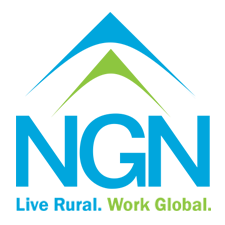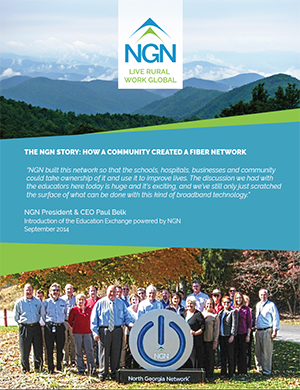 There’s no shortage of ways that broadband helps to transform rural communities: strengthening anchor institutions, increasing educational opportunities, boosting healthcare options, even encouraging civic engagement.[1] Here, we will examine one vehicle through which high-speed internet can help to elevate entire towns, cities and regions thanks to the waves of economic development: businesses. By attracting and retaining businesses and boosting their efficiencies, broadband helps to put rural communities on the global map.
There’s no shortage of ways that broadband helps to transform rural communities: strengthening anchor institutions, increasing educational opportunities, boosting healthcare options, even encouraging civic engagement.[1] Here, we will examine one vehicle through which high-speed internet can help to elevate entire towns, cities and regions thanks to the waves of economic development: businesses. By attracting and retaining businesses and boosting their efficiencies, broadband helps to put rural communities on the global map.
The Stats
An August 2014 study found that rural American counties with high broadband adoption rates (and note that adoption, not just access, is important here) enjoyed higher income growth, while counties with low adoption rates had less growth in numbers of businesses and employees.[2]
Last year, the Hudson Institute found that rural broadband companies added more than $24 billion to their state economies in 2015; rural broadband itself supported roughly $100 billion in e-commerce, and retail sales would have contributed at least $1 billion more if broadband had the reach in rural areas that it does in urban regions.[3]
In addition, a recent article in the American Journal of Agricultural Economics found “that broadband availability has a positive and significant effect on location decisions of new firms in rural areas.”[4]
These stats show that broadband can help rural communities attract and retain new businesses, and it can help businesses tap new markets, buy and sell products online, and more. High-speed broadband also allows rural businesses to take advantage of telecommuting workers when faced with a shortage of local workers or when in need of a very specific skill set.
A Tennessee Case Study
 A prime example of rural broadband transforming communities through business growth can be found with one of Tennessee’s most innovative cities. Perhaps you’ve heard of Chattanooga’s citywide gigabit broadband network, launched in 2010 by municipal utility Electric Power Board (EPB). “The Gig,” as locals call it, is credited with putting the city on the map, drawing in new businesses, establishing Chattanooga as a startup hub, creating thousands of new jobs and adding millions to the local economy. It’s a hard-working network! [5]
A prime example of rural broadband transforming communities through business growth can be found with one of Tennessee’s most innovative cities. Perhaps you’ve heard of Chattanooga’s citywide gigabit broadband network, launched in 2010 by municipal utility Electric Power Board (EPB). “The Gig,” as locals call it, is credited with putting the city on the map, drawing in new businesses, establishing Chattanooga as a startup hub, creating thousands of new jobs and adding millions to the local economy. It’s a hard-working network! [5]
It’s clear that broadband is helping businesses all over the state, in fact. After identifying broadband access as a top initiative for boosting rural economic development efforts, local leaders requested a survey of Tennessee households and businesses. The survey found that broadband was the driving force behind more than 66 percent of business revenues and 43 percent of net new jobs.
As a result of their high-speed internet, more than 300 Tennessee businesses saved almost $30 million in operating costs over 12 months. More than 34 percent of businesses reported that broadband was “essential” in choosing their business location, and nearly 60 percent said it was “essential” for staying in Tennessee. Roughly a quarter of participating households reported operating a home-based business, while about the same number telework.
But sadly, many Tennessee residents still can’t use the incredibly essential business tool that is broadband. About 34 percent of the state’s rural residents still lack access to broadband, compared with only two percent of their urban neighbors. Connectivity speeds for nearly 70 percent of state businesses don’t meet the FCC’s standard for broadband.[6]
What if the entire state enjoyed the same broadband access that’s been a boon for Chattanooga’s economy? What if all rural areas of other states had it, too? How many new jobs could be created and new companies attracted? How much new revenue could be earned?
NGN’s Contribution
This is a vision that NGN is committed to making a reality. The NGN team believes rural residents deserve the same high-speed connectivity their urban neighbors enjoy so they can support themselves, their families and their communities with global work.
We empower customers to “Live Rural. Work Global,” creating tools for better training, teaching and healthcare, and opportunities for businesses and residents to be more efficient and connected.
NGN works with municipalities and electric co-ops (EMCs) to leverage the excess capacity on their networks and bring gigabit connectivity to extremely rural areas. Contact us to learn more and check out this short JSATV interview to hear about our model.
[1] http://theconversation.com/broadband-internet-can-help-rural-communities-connect-if-they-use-it-72941
[2] http://www.nardep.info/BenefitsBroadband8.html
[3] https://hudson.org/research/preview/12428-the-economic-impact-of-rural-broadband
[4] https://academic.oup.com/ajae/article-abstract/99/1/285/2452343/Broadband-Internet-and-New-Firm-Location-Decisions?redirectedFrom=fulltext
[5] http://www.fiercetelecom.com/telecom/chattanooga-1-gbps-adoption-sets-innovation-economic-development-motion
[6] http://www.tn.gov/assets/entities/ecd/attachments/broadband-study.pdf


